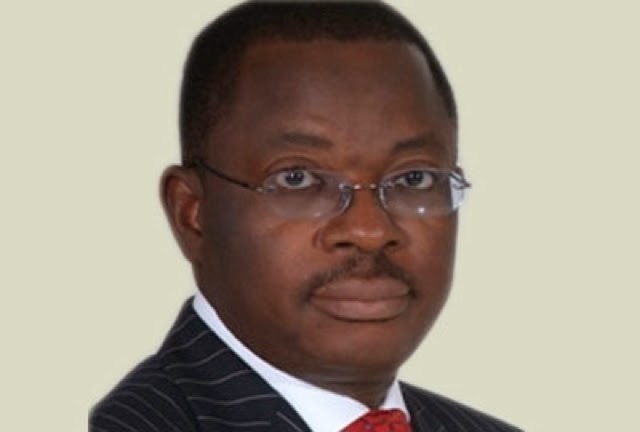Religion, business, sports, music, entertainment, politics and technology
Friday, 28 March 2014
Sanusi shuns Financial Council’s invitation, heads to court
Updated: Court bars Lagos from collecting toll on Lekki-Ikoyi bridge

Thursday, 27 March 2014
Akingbola faces stiff opposition in bid to reclaim Intercontinental Bank
Oyo government owns building used for ritual – Accord Party
Wednesday, 26 March 2014
Intercontinental Bank: Shareholders sue Sanusi for N10bn

Governor of the Central Bank of Nigeria, Mallam Lamido Sanusi
Shareholders of the defunct Intercontinental Bank Plc have asked an Abuja Federal High Court to order the suspended Governor of the Central Bank of Nigeria, Mr. Lamido Sanusi, to pay them N10bn as damages over what they described as the fraudulent banking and investment practices and breaches involved in the sale of the bank.
The plaintiffs, Abdullahi Sani, Adaeze Onwuegbusi and Chijioke Ezeikpe, in the suit filed by their lawyer, Chris Uche SAN, accused Sanusi of conniving with the Managing Director and Deputy Managing Director, Access Bank Plc, Mr. Aigboje Aig-Imokhuede, and Mr. Herbert Wigwe, and Senator Bukola Saraki, to sell the bank in a bid to confer corrupt advantage upon themselves.
The CBN and the Securities and Exchange Commission were joined as defendants in the suit, which came up before Justice Ahmed Mohammed on Tuesday.
Justice Mohammed granted an ex-parte motion in which the plaintiffs sought leave to serve the suit on Sanusi by pasting copies of the originating summons at the headquarters of the CBN.
The plaintiffs also urged the court to order the CBN to immediately recover the sums of N16.2bn and N8.9bn, together with accrued interests, being owed Intercontinental Bank by Aig-Imokhuede, Wigwe and Saraki.
The court was asked to declare that the takeover of Intercontinental Bank by Access Bank on the instructions of the Sanusi “without any lawful justification whatsoever in a bid to confer corrupt advantage upon himself and his friends/associates/cronies” was illegal, null and void.
In the same vein, the plaintiffs asked the court to order SEC to conduct a detailed public investigation into the circumstances surrounding the acquisition on Intercontinental Bank by Access Bank.
In an affidavit in support of the originating summons, the plaintiffs averred that as of August 2009, Intercontinental Bank had a paid up capital of N230bn and a balance sheet of N1.6bn, 330 branches nationwide, 10 subsidiaries and 12,000 workers.
Saturday, 22 March 2014
Igbos said to be descendants of Israelites
TORONTO — It’s remarkable that finding the lost tribes of Israel, who were forcibly dispersed from the Holy Land some 2,800 years ago, still stirs the imagination.
The Jews of Ethiopia, said to be the descendants of the tribe of Dan, are the best known. Most of them now live in Israel.
There’s evidence the Pashtuns of Afghanistan consider themselves descendants of ancient Israel’s first king, Saul, while other groups have surfaced around the world staking a claim to the ancient Israelite heritage.
Now, a barrister in Nigeria, Remy Ilona, asserts that the Igbo people of that western African nation are likewise Israelite descendants.
“As a boy, I heard, like every other Igbo heard, that the Igbo people came from Israel. In primary school, you’re bound to hear that Igbo people came from Israel,” he said in a video lecture delivered last weekend.
Ilona will speak through a recording at Congregation Darchei Noam to be held on Feb. 17 at 7:30 p.m. during Black History Month. The event, sponsored jointly with the Beth Emeth Bais Yehuda Synagogue and the Toronto Jewish Film Festival, included an excerpt of the new film, Re-Emerging: the Jews of Nigeria by director Jeff Lieberman, which will première at the festival in April.
About 10 years ago, Ilona began serious researching the Israelite heritage of the Igbo people. His father, he explained, “always talked about Israel with special interest.”
The research confirmed “what the Igbo always believed, that the Igbo descended from ancient Israelites,” he said.
Ilona believes “97 per cent of Igbos agree that they are Jewish,” while the other three per cent don’t want to be associated with whites, who they see as colonial oppressors.
Ilona dismisses those concerns. Reclaiming one’s heritage has nothing to do with colonialism, he maintains.
Skeptics, however, suggest the Igbo affinity for things Jewish dates back only to western colonial times. One writer on the AfricaIsrael website states this is due to “outside influences and that they were very much a part of the colonial discourse of the British imperialists over their colonized subjects.”
However, a 2012 book review in the Nigerian Voice website offers the opposite conclusion, that the Igbo may have imbibed western culture, but the groups’ origins lie in the Holy Land.
Igbo elder George Ojingwa writes in Igbo Kwenu that the people’s history goes back 4,000 years to the Shechnigbo clan, domiciled in the northern tip of Negev desert, south of Jerusalem. The author associates the Shechnigbo with the tribes of Benjamin and Judah, and according to him, in 740 BCE, they fled for safety when the Assyrians besieged Samaria. Moving south to Ethiopia, they eventually joined others heading to southern Sudan and finally to the northern Nigeria, arriving around 600 BCE.
Ilona said the Igbo and the Jews share many customs. Like the Jews, the Igbo circumcise their male chidren on the eighth day; Jews marry under a chupah, Igbo under a similar canopy; both groups bury their dead quickly; the Igbo, like the Jews, mourn for seven days and around a month after the death, have a ceremony to mark the occasion. Both groups maintain a day of rest.
In his book, The Igbos: Jews in Africa, Ilona records Nigerian oral traditions about the Igbo’s origins. One suggests the Igbo are the descendants of Ethiopian Jewish immigrants; another places the Igbo as the descendants of the tribe of Menashe; others say they are part of the tribe of Levi; still another records their ancestors as Yemeni or Baghdadi princes
In an email correspondence, Ilona said census figures indicated “there are between 17 and 20 million Igbos in Nigeria, and perhaps another 15 million living outside Nigeria.”
About two per cent practice the traditional Igbo religion that is called Ome na ana.
“Up to 90 per cent would say that they are Christians; one per cent would be Muslims; 5,000-50,000 practice rabbinic Judaism, five per cent practice Sabbatharianism, and the rest practice New Age religions.
“Until recent times, every Igbo proudly declared that they have Israelite heritage. But by now we can say that those that identify themselves as descendants of the Israelites would constitute 99.5 per cent of the Igbo population. And these 99.5 belong to all the religions that exist among the Igbos.”
Ilona said the Igbo are generally well off: “Many Igbos are wealthy, but they became wealthy because they worked hard. Working hard is not the traditional way to getting rich in Nigeria. Corruption, cronyism, patronage are the traditional and acceptable ways, and through these route Igbos get less income and wealth than other Nigerians, because Igbos have effectively been kept away from political power in Nigeria”
The Igbo have been caught up in the factional fighting that is racking Nigeria. “I say caught in the middle, because even though the Igbos are seen as predominantly Christians, which they are, they have also been killed by Nigerian Christians from other ethnicities. And also the Igbos are in the firing line. They own up to 90 per cent of the retail shops in Nigeria, and these retail shops are the targets of looters whenever the ethnic-cum-religious riots begin.”
As for the Igbos connections to the wider Jewish world, Ilona states in his video presentation that the group, Kulanu has provided support for the Igbo, along with a number of individuals and rabbis, who have sent numerous religious texts. Kulanu is a New York-based organization that states it “works around the world to support isolated and emerging Jewish communities who wish to learn more about Judaism and (re-) connect with the wider Jewish community.”
As for himself, Ilona leads a Jewish lifestyle, worshipping in a synagogue, living according to a Jewish calendar, celebrating Shabbat and festivals.
“We follow every Jewish ritual as it is followed,” he stated.
North seeks N100bn to rebuild North East from Boko Haram terrorist’s destruction
 Northern lawmakers have put the losses resulting from Boko Haram attacks in the North-East at over N100bn and claimed that the amount was needed to rebuild the zone.A member of the House of Representatives from Borno State, Mr. Abdulrahman Abba-Terrab, who moved a motion on the cost of the attacks.
Northern lawmakers have put the losses resulting from Boko Haram attacks in the North-East at over N100bn and claimed that the amount was needed to rebuild the zone.A member of the House of Representatives from Borno State, Mr. Abdulrahman Abba-Terrab, who moved a motion on the cost of the attacks.

